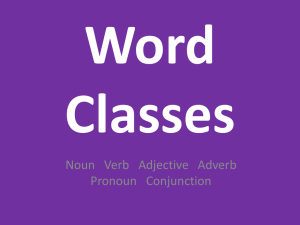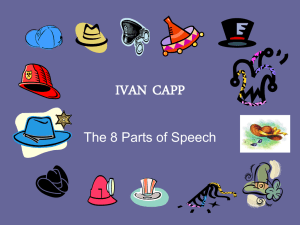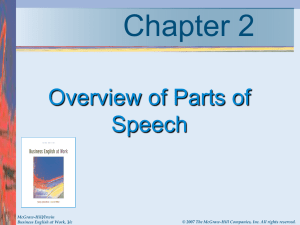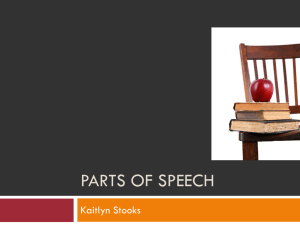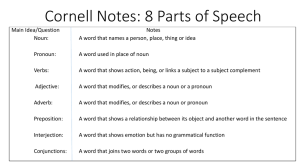E9L2: Parts of Speech
advertisement
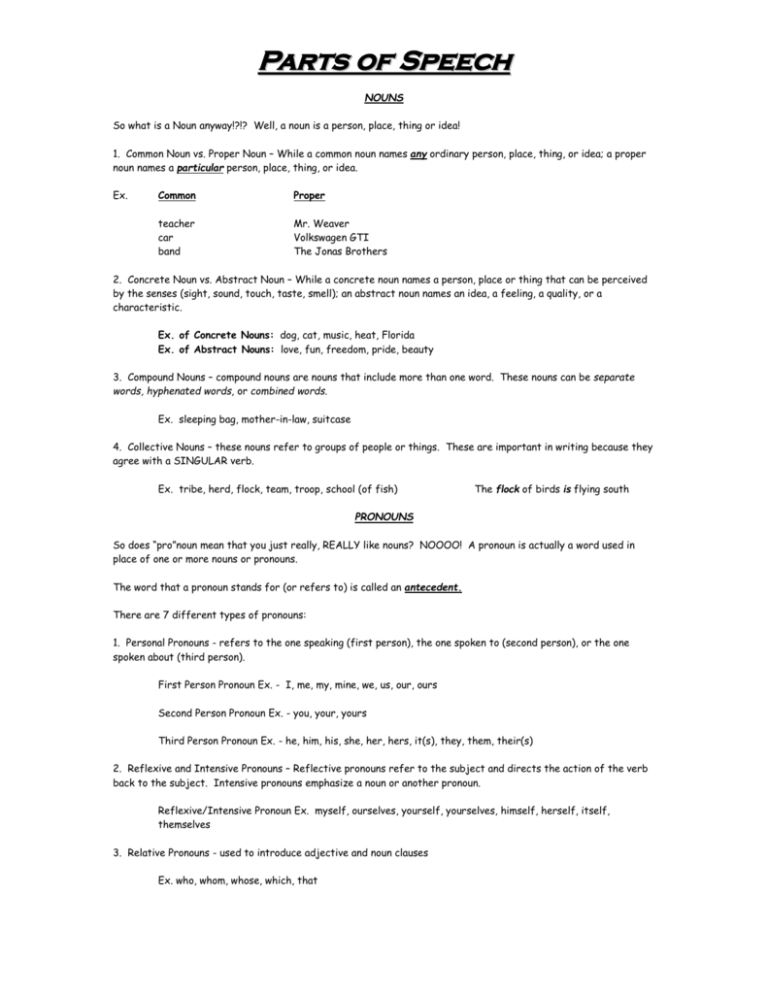
Parts of Speech NOUNS So what is a Noun anyway!?!? Well, a noun is a person, place, thing or idea! 1. Common Noun vs. Proper Noun – While a common noun names any ordinary person, place, thing, or idea; a proper noun names a particular person, place, thing, or idea. Ex. Common Proper teacher car band Mr. Weaver Volkswagen GTI The Jonas Brothers 2. Concrete Noun vs. Abstract Noun – While a concrete noun names a person, place or thing that can be perceived by the senses (sight, sound, touch, taste, smell); an abstract noun names an idea, a feeling, a quality, or a characteristic. Ex. of Concrete Nouns: dog, cat, music, heat, Florida Ex. of Abstract Nouns: love, fun, freedom, pride, beauty 3. Compound Nouns – compound nouns are nouns that include more than one word. These nouns can be separate words, hyphenated words, or combined words. Ex. sleeping bag, mother-in-law, suitcase 4. Collective Nouns – these nouns refer to groups of people or things. These are important in writing because they agree with a SINGULAR verb. Ex. tribe, herd, flock, team, troop, school (of fish) The flock of birds is flying south PRONOUNS So does “pro”noun mean that you just really, REALLY like nouns? NOOOO! A pronoun is actually a word used in place of one or more nouns or pronouns. The word that a pronoun stands for (or refers to) is called an antecedent. There are 7 different types of pronouns: 1. Personal Pronouns - refers to the one speaking (first person), the one spoken to (second person), or the one spoken about (third person). First Person Pronoun Ex. - I, me, my, mine, we, us, our, ours Second Person Pronoun Ex. - you, your, yours Third Person Pronoun Ex. - he, him, his, she, her, hers, it(s), they, them, their(s) 2. Reflexive and Intensive Pronouns – Reflective pronouns refer to the subject and directs the action of the verb back to the subject. Intensive pronouns emphasize a noun or another pronoun. Reflexive/Intensive Pronoun Ex. myself, ourselves, yourself, yourselves, himself, herself, itself, themselves 3. Relative Pronouns - used to introduce adjective and noun clauses Ex. who, whom, whose, which, that Parts of Speech 4. Interrogative Pronouns - used to begin questions Ex. Who, whom, whose, which, what 5. Indefinite Pronouns - used to point out an indefinite person, place, thing or idea Ex. all, another, each, more, one, any, anybody, none, no one, someone, anyone 6. Demonstrative Pronouns - used to point out a specific person, place, thing or idea Ex. this, that, these, those VERBS Just let me ask you one question. Just one . . . have you ever “verbed” anything!?!? 1. Action Verbs – these verbs tell what action the subject of a sentence is performing. They can also show mental action or ownership. Ex. My drivers ed. teacher flicked a booger onto the windshield of the car. Ex. Always remember to zipper your fly before leaving the restroom! A. Transitive Verbs vs. Intransitive Verbs – actions verbs that are transitive have an object after them, but intransitive verbs do not have an object after them. So how do you like your verbs, transitive, intransitive, or well done? ;) Transitive Verb Ex.: She dissed my ride! (So what or who was “dissed”? “My ride” of course! [Oh no she didn’t!]) Intransitive Verb Ex. – I chilled at his crib. (So what or who did I chill? Ummm . . . I don’t know because it doesn’t say!) B. Verb Phrase – a verb phrase is a main action verb and one or more helping (auxiliary) verbs. It’s sort of like a verb that needs a buddy! (You know, like girls who go to the restroom together!) Common Helping/Auxiliary Verbs: am, is, are, was, were, be, being, been, has, have, had, do, does, did, may, might, must, can, could, shall, should, will, would Ex. Oh my! I have dropped it like it is hot! Ex. I shall shizzle my dizzle! 2. Linking Verbs – linking verbs link the subject with another word in the sentence. And just so you know, the “other word” usually names or describes the subject. A. Forms of verb “be” are the most common linking verbs! “Be” Linking Verb Ex.: be, being, is, am, are, was, were, been, shall be, will be, can be, could be, should be, would be, may be, might be, must be, have been, has been, had been, could have been, should have been, would have been, may have been, might have been, must have been. Sentence Ex. – I am “da bomb”! B. Additional Linking Verbs – these linking verbs look like action verbs, but they are not showing action; they are linking idea together! Parts of Speech Linking Verb Ex. appear, feel, look, seem, sound, taste, become, grow, remain, smell, stay, turn. Sentence Ex. – My ride looks wicked! ADJECTIVES Adjective - a word that modifies a noun or pronoun. Adjectives answer one of the following questions: What kind? How many? Which one(s)? How much? Adjectives can also appear in different places. They can be: Before a Noun: A blue fish lives in my closet. After a Noun: The fish, large and stripped, ate my apple. After Linking Verbs: The fish is happy! 1. Proper Adjectives – proper adjectives are formed from proper nouns. Ex. Thanksgiving dinner, African country, Halloween night 2. Compound Adjectives - compound adjectives are made up or two or more words. Ex. faraway lands, household chores, kick-butt job 3. Articles – articles are the most commonly used adjectives. Ex. a, an, the 4. Nouns Used as Adjectives - When a noun modifies another noun or pronoun, it is considered an adjective. Ex. bean soup, spring weather, gold coin 5. Demonstrative, Interrogative and Indefinite Adjectives – these words can be either pronouns or adjectives depending on the way they are used in a sentence. Ex. Words: this, that, these, those, what, which, whose, all, another, any, both, each, either, few, many, more, most, neither, other, several, some Ex. Sentence – That bratwurst is mine! ADVERBS Adverbs - a word used to modify a verb, an adjective, or another adverb. Adverbs modify by telling how, when, where, or to what extent. Ex. The The The The snake was snake was snake was snake was hissing loudly. (how) hissing today. (when) hissing outside. (where) hissing constantly. (to what extent) Parts of Speech 1. Adverbs Modifying Verbs Ex. She runs early. Ex. Rosa can really skate. Ex. That truck can actually drive over large rocks. 2. Adverbs Modifying Adjectives Ex. The exceptionally brave police officer was given an award. Ex. Under the hood of the Mustang sat an incredibly huge V8. Ex. That massively modified Volkswagen just blew the doors off of that Honda. 3. Adverbs that Modify Other Adverbs Ex. The guide spoke extremely slowly. Ex. She skated very well. Ex. His hair is incredibly curly. Hint: Some of the most commonly used adverbs are: too, very, and so. Many other adverbs end in -ly, but not all of them. PREPOSITIONS Preposition - a word that shows the relationship of a noun or a pronoun to some other word in the sentence. Prepositions often indicate direction, time, or location. Compound Prepositions – a preposition that is made up of two or more words. Commonly Used Prepositions/Compound Prepositions: About Above Across After Against Along Among Around at because of Before Behind below beneath beside(s) between beyond but by concerning despite down during except excepting for from in in front of inside in spite of instead of into like near of off on onto out outside over past regarding since through throughout to toward under underneath until up upon up to with within without with regard to with respect to Prepositional Phrases - includes the preposition, a noun or pronoun (called the object of the preposition) and any modifiers of the object. Examples of Prepositional Phrases: On top of the house, in the monkey, outside of my turnip, through the pelican CONJUNCTIONS Conjunctions - a word or words used to connect join words or groups of words called phrases or clauses. - There are three different types of conjunctions: 1. Coordinating Conjunctions - join equal parts of a sentence. Example Words: and or for but so yet nor Parts of Speech Ex. sentence using a coordinating conjunction: Nathan really likes cars, but he also really likes video games. 2. Correlative Conjunctions - like coordinating conjunctions, correlative conjunctions also join two equal parts of a sentence. Ex. Correlative Conjunctions: both . . . and not only . . . but also either . . . or whether . . . or neither . . . nor Ex. sentence using a correlative conjunction: Neither the football team nor the soccer team has practice today. 3. Subordinating Conjunctions - begin adverb clauses and join them to the rest of the sentence. - Common Subordinating Conjunctions: after although as as if as long as as much as as soon as as though because before even if even though how if in as much in order that lest now that provided (that) since so that than that though till ( or 'til) unless until when whenever where wherever while Ex. sentence using a subordinating conjunction: Although Chinese food is usually served with rice, the restaurant we went to served us noodles instead. INTERJECTIONS Interjections - a word that expresses emotion and has no grammatical relation to other words in the sentence. Ex. Ouch! Ugh! Well, Oops! - Well, I’m just not sure. - When I’m having a bad week, oh, I can hardly wait for the weekend. - Ouch, the bee sting really hurt!


